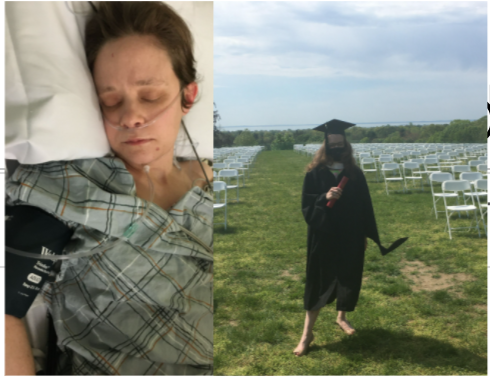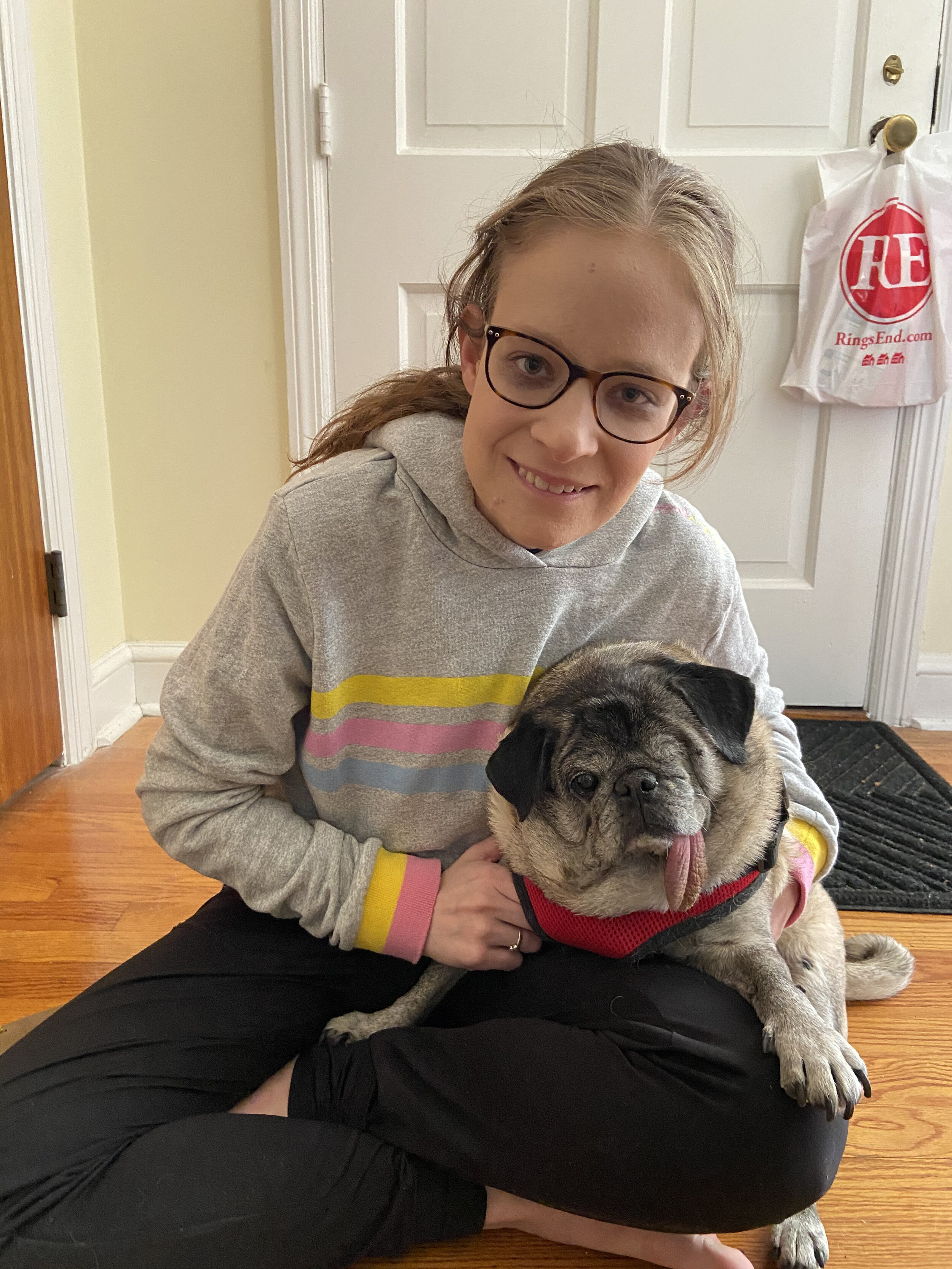Coping | Disability | IBD

Two photos of the blogger appear side-by-side. In the photo to the left, the author is in the hospital. The photo on the right shows the blogger getting her MA degree.
The Americans with Disability Act of 1990 defines disability as an impairment that significantly limits at least one major life activity. For almost two decades, people debated the meaning of significant impairment and everyday life activities. Erring on the side of caution, courts rejected claims of people with fluctuating conditions and illnesses that did not directly compromise their ability to perform obvious tasks such as walking, talking, seeing, hearing. Fortunately, the Americans with Disabilities Amendments Act of 2008 affirmed the disability status of those with fluctuating conditions and added a number of bodily functions to the list of everyday activities, including digestive and bowel function.
As a result, people with fluctuating conditions like IBD are protected under the ADA. However, personal identity is more complex than legal definitions. As a person with multiple fluctuating chronic health conditions and mental health challenges, I struggle to maintain a consistent identity. I can go for weeks or months with serious problems that infringe on every aspect of my life. I have spent weeks at a time in hospitals on TPN. Even during flares that do not require hospitalization, I often find myself chained to the bathroom. Fatigue and dehydration can bring me to my knees. I cannot count how many times I have needed to sit down in public places to avoid fainting. It is amazing how fast you can learn to create a makeshift seat out of store shelves or sidewalks. Time is of the essence because a delayed response can mean passing out. At these times, chronic illness becomes the core of my identity.
However, there are moments where my identity becomes murky; For example, when I am coming out of a flare or recovering from surgery. These are periods of growth and expanding ability. I start leaving the house more and standing up in the shower! But, I am still cautious. My spoons are limited and I know that my health can regress if I am not careful. I can finally take a trip to the store, but I will need to prepare for it before and decompress when I get home. These are the times where I identify as a person who happens to be dealing with chronic illnesses. I look at it like this: I have these illnesses, but they no longer have me. These are often the moments when my chronic illness warrior confidence is at its highest. Every accomplishment, from a victory lap around the nurse station to the first day back to school or work, feels like a victory.
And then, there are other times when I can go for weeks or months feeling almost normal. Sure, I might have less energy than my peers and I may go to the bathroom a bit more, but I am not controlled by disease, nor am I engaged in the recovery battle. During these tranquil times, I do not know where I belong. I feel like a fraud when identifying as disabled or chronically ill because I can work full-time, attend graduate classes, and go to the store without needing to take a nap immediately upon my return. I can even go swimming or hiking! I sometimes wonder if I can say I am ill at such times. Biologically, my illnesses are still there beneath the surface, but can I really say they are a part of me when I am in clinical remission?

The blogger hanging out with her pug friend, Victoria.
At the same time, I do not fit in with the healthy community. Even on pain-free, peaceful days, I need to be mindful of how I spend my energy. I need to think about and plan for the future. The possibility of flares and complications is always on my mind. Sometimes it is like a cobweb in the corner of a big room. It is visible and I will periodically look up to ensure that it is not growing too fast; I can still go about my life. Other times, it is like a downpour, flooding out my other thoughts. Seemingly small symptoms or anomalies with my body’s function can put me into full-blown panic mode (Thank you, Generalized Anxiety Disorder!). It is easy for a healthy person to shrug a vomiting spell off as some bad shrimp or a bug. For me, it is more. Every stomach ache, joint ache, headache, random bruise, or dizzy spell makes me question the future. My healthy (well-meaning) friends think I am overreacting or letting my anxiety get the better of me, but there is a logical reason behind this fear. My experience has taught me how fast something that feels minor can escalate into a nightmare.
Another way I differ from the healthy community in times of remission is that I cannot take a ‘sick day’ when my allergies are acting up or I have a pressure headache. I need to reserve this time off for the days I cannot pull myself out of bed. Even then, there is a fear of misusing them. What if I have a bad flare that puts me in the hospital? Will I have enough sick days to keep my job and thus my much-needed health insurance?
There are also valuable insights chronic illness has given me that not all of my healthy friends possess. I am increasingly challenged to define myself by my character as opposed to my fluctuating exterior image and production rates. My physical appearance and productivity can change easily, so it seems dangerous to place too much value on these. Instead, I focus on my values, my interests, and my passions. I am also learning to accept the things that I do not have control over. I no longer get upset when things do not go as planned because I know that this is life. I cannot obsess over the things I cannot control. Doing so only makes matters worse. And, it really is amazing most things are at the end of the day. Finally, I see beauty in simple things like being home or eating without pain. You cannot fully value such experiences until you have gone without them.
My relationship with my body and chronic illnesses is ever-changing. I am chronically ill. This identity remains with me throughout the ups and downs of my life. Sometimes, this identity is at the forefront of my being. Other times, it is more subtle; it is the way I live my life or the manner in which I connect with others who are going through hard times. If you are grappling with how fluctuating conditions impact your identity, please know that you will always have a home in the chronic illness/ GWG community.
